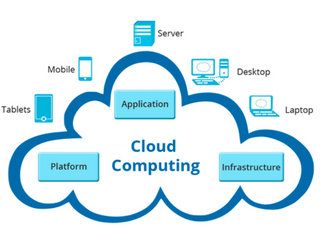Advertisement
You may have heard about cloud computing before, but what is it, exactly? Cloud computing is the ability to access information and applications over the Internet. This means that instead of having a program installed on your computer, you can access it, or store it, on a remote server.
Advertisement
Advertisement
Cloud computing services are perfect for businesses because they offer a wide range of benefits. For example, they’re more cost-effective than traditional software, they’re scalable to meet the needs of your business, and they’re secure and reliable.
In this article, we’ll explore the benefits of cloud computing services in more detail and show you why they’re the future of business.
What Is Cloud Computing?
Cloud computing is the latest and greatest buzzword in business, and for good reason. It offers a number of advantages over traditional computing methods.
To start with, cloud computing is scalable, meaning that businesses can add or subtract resources as needed. This makes it an ideal option for businesses that are growing or experiencing fluctuations in demand.
Cloud computing is also very reliable. In fact, studies have shown that cloud-based systems are more reliable than traditional systems. This is because cloud-based systems are designed to automatically recover from outages, whereas traditional systems often require manual intervention.
Finally, cloud computing is cost-effective. businesses can save up to 80% on their IT costs by moving to the cloud.
How Cloud Computing Can Benefit Businesses
Cloud computing is no longer a new technology; in fact, it’s been around for about two decades. However, businesses are only now beginning to understand the full potential of the cloud and the many ways it can benefit their operations.
Some of the ways cloud computing can benefit businesses include:
– Reduced IT costs: When businesses move to the cloud, they no longer need to purchase and maintain expensive hardware and software. This can result in significant cost savings.
– Increased efficiency and productivity: Employees can access data and applications from any device, anywhere, anytime. This increases flexibility and allows employees to be more productive.
– Faster time to market: By using cloud services, businesses can quickly and easily launch new applications and services without having to invest in infrastructure or software.
– Greater scalability: The cloud can easily accommodate changes in demand, so businesses can expand or reduce their services as needed.
Types of Cloud Computing Services
When it comes to cloud computing services, there are three main types: public, private and hybrid. Each one has its own unique benefits and drawbacks, which is why it’s important to understand the differences before you make a decision.
Public cloud services are offered by third-party providers and are the most common type. They’re typically low-cost and easy to set up, but they can be less secure than private or hybrid clouds.
Private cloud services are hosted by a single organization and offer more security but can be more expensive to set up and maintain.
Hybrid cloud services combine elements of both public and private clouds, giving you the best of both worlds. They’re more secure than public clouds and more affordable than private clouds, making them a popular choice for businesses.
Security Concerns With Cloud Computing
One concern businesses often have when considering cloud computing is security. After all, you’re trusting someone else to keep your information safe. But the truth is that cloud computing services are usually more secure than storing data on-site.
When you use a cloud service, the provider will use encryption, two-step authentication and access controls to secure your data and prevent it from being accessed or misused. This may include automatic updates to ensure your security protocols are up to date, as well as regular backups of your data which can be recovered in the event of an emergency.
Furthermore, cloud service providers typically deploy a wide range of infrastructure technologies designed to guard against potential threats. This can include firewalls and intrusion detection systems, which guard against malicious actors who may try to access your data without permission.
So while cloud computing services don’t guarantee absolute security, they do provide a safe environment for businesses looking to store their information securely in the cloud.
Advantages and Disadvantages of Cloud Computing Services
It’s important to recognize that there are positives and negatives for investing in cloud computing services. On the one hand, you get access to vast storage and computing power, which can make a huge difference for large businesses. On the other hand, cloud computing comes with security risks, not to mention the ongoing cost of paying for these services.
The key is for business owners to weigh these two propositions against each other and decide which path is the better long-term option. If you need a lot of storage or computing power, the cost of investing in cloud services can be lower than buying your own hardware over time. However, if your business needs are small and manageable with existing resources, then it might not make sense to pay extra for premium cloud services.
At the end of the day, it’s up to you to consider which route is worth taking—but having access to powerful cloud-computing services gives business owners more options than ever before when it comes to making decisions about their IT needs.
Conclusion
In other words, by freeing up your team’s time and resources, you can actually increase your business output by utilizing cloud computing services. You’re able to focus on your core competencies and leave the IT services to the experts.
Not to mention, with cloud computing, you have the added security of knowing that your data is safe and sound, due to the redundancies and multiple layers of security that are in place. So, if you’re looking to take your business to the next level, it’s time to consider making the switch to cloud computing services.


